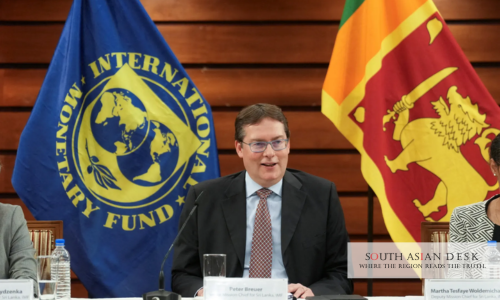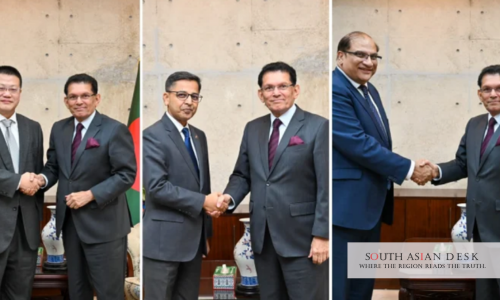COLOMBO, Sri Lanka (South Asian Desk) – The IMF and Sri Lanka staff-level agreement on Thursday for the fifth review under the Extended Fund Facility (EFF), unlocking about US$347 million in financing pending Executive Board approval. This step addresses who is involved, what it entails, when it occurred, where discussions happened, why it advances reforms, and how it bolsters reserves.
Why This IMF Sri Lanka Staff-Level Agreement Resonates Across South Asia
The IMF Sri Lanka staff-level agreement holds broad significance for South Asia’s interconnected economies. Sri Lanka’s 2022 default sent shockwaves through the region, spiking borrowing costs for neighbours like Pakistan and Bangladesh. This fifth review under the EFF demonstrates viable paths to debt restructuring and fiscal discipline, offering a blueprint for crisis-hit nations. Stronger Sri Lankan reserves could stabilise remittances and trade flows, easing pressures on India’s export markets and Bangladesh’s apparel supply chains. Yet, global uncertainties like trade tensions underscore the need for collective regional buffers, making this deal a test case for IMF-South Asia synergy.
Key Details of the IMF Sri Lanka Staff-Level Agreement
IMF staff led by Mission Chief Evan Papageorgiou concluded talks in Colombo on October 9, 2025, after a mission from September 24. The agreement covers economic policies for the fifth review of Sri Lanka’s 48-month EFF arrangement, approved in March 2023 for SDR 2.286 billion (about US$3 billion).
This tranche brings total disbursements to about US$2.04 billion upon approval. Sri Lanka has met quantitative performance criteria and indicative targets, including on net international reserves and debt ceilings. Gross official reserves stood at US$6.5 billion by end-March 2025, up from prior levels due to central bank purchases.
Papageorgiou stated: “The economic reforms implemented by the Sri Lankan authorities have continued to support the recovery, with inflation progressing to target, reserves accumulating, and real GDP growth and revenue mobilisation outperforming expectations.” He added: “Performance under the programme has been strong. Advancing reforms is key to ensuring macroeconomic stability, anchoring the recovery, and equipping Sri Lanka to better withstand external shocks amid an uncertain global environment.”
The deal emphasises fiscal consolidation. Sri Lanka’s primary surplus hit 2.4 per cent of GDP in the first half of 2025, exceeding targets. Revenue measures include property taxes and VAT adjustments, boosting collections by 25 per cent year-on-year.
Progress on Sri Lanka’s Fifth Review Under EFF
The Sri Lanka fifth review EFF marks a milestone in the island’s post-crisis trajectory. Real GDP grew 4 per cent on average in the four quarters to June 2025, with high-frequency data showing expansion across sectors. Inflation has eased to within central bank targets, down from double digits in 2023.
Central Bank of Sri Lanka Governor Nandalal Weerasinghe noted in a statement: “The authorities remain committed to the ambitious reform agenda under the EFF. Their reform efforts have been commendable, including rapid disinflation and a significant fiscal adjustment.” Reserves rebuilt to US$6.5 billion support import cover, now at five months.
Debt restructuring nears completion, with official Creditor deals and private bond swaps reducing maturities. The programme targets a debt-to-GDP ratio below 95 per cent by 2032. Social safety nets like Aswesuma have expanded, covering 1.5 million households and cushioning 40 per cent of the poor.
Challenges persist. External shocks, including geopolitical tensions, pose downside risks. The IMF urged: “The reform momentum should be sustained to safeguard macroeconomic stability and enhance Sri Lanka’s resilience to shocks. This is particularly important given heightened downside risks to the economy from persistent trade policy uncertainty and geopolitical tensions.”
Fiscal Reforms Driving the IMF Sri Lanka Staff-Level Agreement
Central to the IMF Sri Lanka staff-level agreement are revenue and spending reforms. The 2026 budget must align with programme parameters, focusing on strong revenue measures and prudent execution. Efforts include improving tax compliance, broadening the base, and strengthening exemption frameworks.
Sri Lanka introduced digital invoicing for VAT, cutting evasion by 15 per cent in pilot sectors. Public financial management upgrades, like integrated treasury systems, enhance transparency. The IMF highlighted: “The country requires sustained efforts to improve tax compliance, broaden the tax base, strengthen tax exemption frameworks and enhance public financial management among other measures.”
State-owned enterprise (SOE) reforms cap guarantees at LKR 500 billion (US$1.7 billion), down from LKR 1 trillion pre-crisis. Energy sector tariffs rose 20 per cent, aligning costs with revenues and reducing subsidies by LKR 200 billion annually.
Governance advances feature an anti-corruption action plan from the 2024 diagnostic. This includes asset declarations for officials and procurement audits, vital for investor confidence.
Economic Recovery under the Sri Lanka Fifth Review EFF
The Sri Lanka fifth review EFF underscores broad recovery. Tourism rebounded to 2.2 million visitors in 2025, up 30 per cent, generating US$2.5 billion in forex. Exports grew 10 per cent, led by apparel and tea.
Monetary policy tightened with rates at 8 per cent, curbing Credit growth to 5 per cent. Financial sector stability improved, with non-performing loans falling to 4 per cent from 12 per cent peaks. Poverty rates dipped to 22 per cent from 25 per cent, aided by cash transfers. Yet, inequality remains, with rural areas lagging urban gains.
The IMF Sri Lanka staff-level agreement validates these strides but stresses continuity. Papageorgiou warned: “Maintaining macroeconomic stability and restoring debt sustainability are key to securing Sri Lanka’s prosperity and require persevering with responsible fiscal policy.”
Background: Sri Lanka’s EFF Journey
Sri Lanka entered the EFF in 2023 after defaulting on US$51 billion in debt. The programme prioritises fiscal sustainability, price stability, reserve rebuilding, governance, and growth reforms. Prior reviews unlocked US$1.7 billion, with the fourth in July 2025 adding US$350 million.
This fifth review builds on third and fourth successes, where GDP outperformed forecasts by 1.5 percentage points.
What’s Next for the IMF Sri Lanka Staff-Level Agreement
The IMF Executive Board will review the agreement in late November 2025. Approval triggers disbursement by December, funding budget deficits and imports. Sri Lanka eyes sixth review in early 2026, targeting 5 per cent growth.
Ongoing priorities include finalising private Creditor deals and climate-resilient investments. Regional partners like India, which extended US$4 billion in lines, watch closely for spillover benefits.
This IMF Sri Lanka staff-level agreement signals cautious optimism, yet sustained reforms will determine long-term stability.
Published in SouthAsianDesk, October 9th, 2025
Follow SouthAsianDesk on X, Instagram, and Facebook for insights on business and current affairs from across South Asia.






